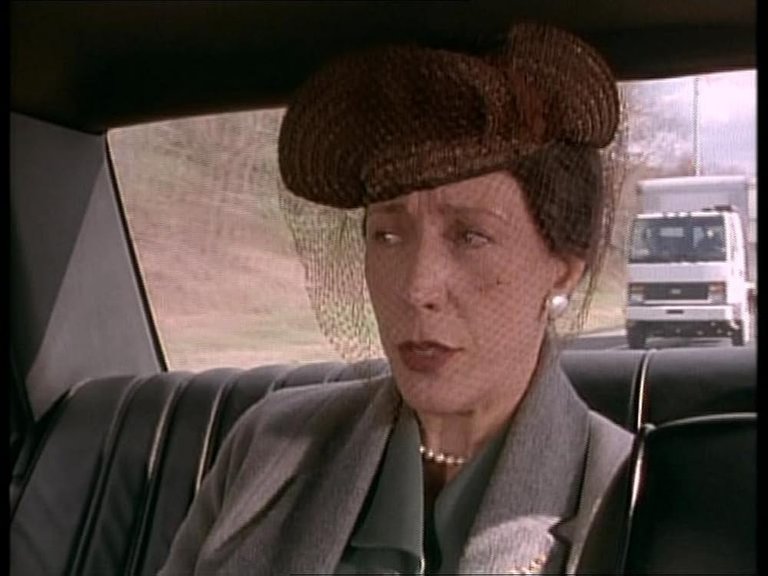Television Review: The Hat (Homicide: Life on the Street, S4X12, 1996)

The Hat (S04E12)
Airdate: 19 January 1996
Written by: Anya Epstein
Directed by: Peter Medak
Running Time: 47 minutes
Homicide: Life on the Street has long been celebrated for its unflinching portrayal of Baltimore’s grim underbelly, rejecting the sanitised resolutions typical of police procedurals in favour of morally ambiguous, often unsatisfying conclusions. Yet in The Hat, the series’ writers appear to abandon their trademark grit, crafting a narrative where contrivance overshadows realism. The episode strains credibility, piling misfortune upon the detectives with a zeal that feels more farcical than fatalistic. While moments of dark humour and character depth linger, the plot’s reliance on exaggerated missteps and jarring tonal shifts undermines the show’s foundational commitment to authenticity.
The central storyline hinges on Detectives Kellerman (Reed Diamond) and Lewis (Clark Johnson) being tasked with escorting Rose Halligan (Lily Tomlin), an eccentric opera enthusiast accused of murdering her adulterous husband. Initially dismissive of her threat—viewing her as a harmless, if irritating, elderly woman—the duo’s complacency borders on incompetence. After a botched restroom escape attempt, Halligan’s swift return lulls them into a false sense of security, leading to a diner stop where she vanishes for good. The consequences are dire: Halligan later resurfaces near the corpse of her husband’s lover, Greta, forcing Kellerman and Lewis to confront their professional negligence. While the premise aims to critique institutional arrogance, the detectives’ repeated lapses feel less like tragic flaws and more like narrative devices to engineer chaos. Tomlin’s performance, though spirited, leans into caricature, her shrill demeanour grating rather than menacing. The subplot’s melodrama clashes with Homicide’s usual restraint, though Kellerman’s brooding reflections on his crumbling marriage offer a glimmer of the psychological complexity that would define his arc in later seasons.
Parallel to this farce is the Unit’s upheaval following the announcement of a new captain. Anticipating Lieutenant Giardello’s (Yaphet Kotto) promotion, the team is stunned when Deputy Commissioner Barnfather names Roger Gaffney—a disgraced former detective ousted for incompetence and racism—as their leader. The twist stretches credulity, reducing institutional politics to a hollow shock tactic. While subsequent episodes would contextualise Gaffney’s rise through backroom dealings, here it plays as a lazy contrivance, undermining the show’s nuanced exploration of bureaucratic rot. Giardello’s uncharacteristic bewilderment further strains believability, given his established political savvy. The subplot’s abruptness smacks of Hollywood sensationalism, a rare misstep in a series otherwise adept at balancing realism with moral ambiguity.
In a quieter yet equally bleak thread, Detective Munch (Richard Belzer) grapples with a moral dilemma during a murder trial. Desperate to secure a conviction, he pressures videographer J. H. Brodie (Max Perlich) to suppress a tape lacking crucial evidence. Brodie’s conscience compels him to hand the tape to the defence, resulting in the killer’s acquittal—a outcome Munch foresaw but hoped to avoid. The fallout is devastating: Munch coldly plays the verdict tape to Brodie, poisoning their relationship. This storyline exemplifies Homicide’s strength in exploring ethical grey areas, though Brodie’s sudden righteousness feels underdeveloped. A darkly comic interlude—where Munch accidentally watches a pornographic tape from Brodie’s locker—adds levity but underscores the episode’s tonal inconsistency. The humour, while welcome, clashes with the gravity of the trial’s consequences.
Epstein’s script intersperses the bleakness with surreal detours, such as a rest stop at the Enchanted Forest amusement park. The setting’s eerie decay—a metaphor for the detectives’ crumbling professionalism—offers visual intrigue but relies on familiarity with the franchise to land its full impact.
The Hat is one of the flawed outliers in Homicide’s otherwise sterling run. Tomlin’s over-the-turn performance and Gaffney’s improbable promotion strain suspension of disbelief, though the latter’s ramifications would later enrich the show’s exploration of systemic corruption. While Kellerman’s nascent darkness and Munch’s ethical quandaries hint at the complexity to come, the episode ultimately feels like a misstep—a rare instance where the writers prioritised plot mechanics over the textured realism that defined the series. For a show that thrived in the shadows, The Hat shines too harsh a light on its characters’ follies, sacrificing subtlety for spectacle.
RATING: 5/10 (++)
Blog in Croatian https://draxblog.com
Blog in English https://draxreview.wordpress.com/
InLeo blog https://inleo.io/@drax.leo
Hiveonboard: https://hiveonboard.com?ref=drax
Rising Star game: https://www.risingstargame.com?referrer=drax
1Inch: https://1inch.exchange/#/r/0x83823d8CCB74F828148258BB4457642124b1328e
BTC donations: 1EWxiMiP6iiG9rger3NuUSd6HByaxQWafG
ETH donations: 0xB305F144323b99e6f8b1d66f5D7DE78B498C32A7
BCH donations: qpvxw0jax79lhmvlgcldkzpqanf03r9cjv8y6gtmk9
This was not only the story of Detective Rose Halligan who disappeared under their noses, but also the shock of Gaffney's appointment as commander of the unit.